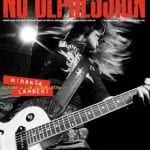Uncle Earl – Younger than that now
“We’ve each had love relationships that have started and/or ended in the course of this band, we’ve seen each other move to new places and start and end other projects, and cut our hair, and grow our hair. This band is up there in the pantheon with your family and things you can’t get rid of.” Kristin Andreassen
The sum of the ambition that first brought Uncle Earl together was quite modest: to play the old-time and string-band music they adored with like-minded people. Their audience was negligible, so if it initially seemed a dubious endeavor, well, no matter. At least they were having a marvelous time.
“This band wasn’t making any money, this band made no sense in any way,” says fiddler Rayna Gellert. “I kept doing it because I wanted to be spending time with these people. So it’s kind of a bonus that people actually want to hear us.”
In the last couple years, the band’s spirited music and onstage verve has gained Uncle Earl greater distinction than they ever expected. After releasing the acclaimed She Waits For Night (produced by old-time aficionado Dirk Powell) in 2005, they’re now touring behind the March release of their second Rounder Records disc, Waterloo, Tennessee (produced by Led Zeppelin bassist John Paul Jones).
When founder KC Groves began the band in 1999 in Ann Arbor, Michigan, it was to support a one-record venture into traditional material recorded with her friend Jo Serrapere, 2000’s self-released She Went Upstairs. But live shows promoting the album went over well, and the project and personnel began to evolve. Slowly.
For the nearly four years the current lineup has been together, they’ve divided their lives between other bands, a variety of solo projects, and Uncle Earl. They live states apart: Gellert in Asheville, North Carolina; Groves in Lyons, Colorado; banjo player Abigail Washburn in Nashville, Tennessee; and multi-instrumentalist and clogger Kristin Andreassen in Boston, Massachusetts.
In the last year or so, their lives have come to orbit around Uncle Earl. “It seems like because of our prioritizing the band, really great things are happening for us, and I don’t know how easy it’s actually going to be to turn it down again for another year,” Washburn says. “It seems like with this band, any ounce of effort we put into it exponentially returns.”
“It’s the hot dudes, man,” Andreassen jokes.
“The drugs and the hookers,” Gellert responds. Which inevitably leads to a cheeky tale from their long road.
One night in California, some years back, Andreassen was put in charge of navigating toward a gig in Fresno. “We left San Francisco and drove two hours in the wrong direction,” she says. “We arrived fifteen minutes after our show was supposed to start and there were two people in the room, both of whom were there by mistake. Then they ordered us pizza, probably because they felt sorry for us.
“And then,” says Groves, “a hooker almost broke into our hotel room later that night. An angry hooker. She actually did damage to the door.”
“Yeah,” says Gellert. “I would say that is the moment when we knew [the band] was going to take off.”
On the lineup this year at festivals including Merlefest, Grey Fox Bluegrass Festival and Bonaroo, following a unexpectedly popular U.K. tour, Uncle Earl has also become a kind of holding ground for each of their extended lives, musical and beyond. Their performances incorporate Washburn’s study of Chinese language and culture, Andreassen’s dancing, each of their songwriting (Andreassen is a finalist for the John Lennon Children’s Song of the Year), and pieces of their historical research interests. Travel between gigs is filled with political discussion and gossip — truly, they rarely shut up.




